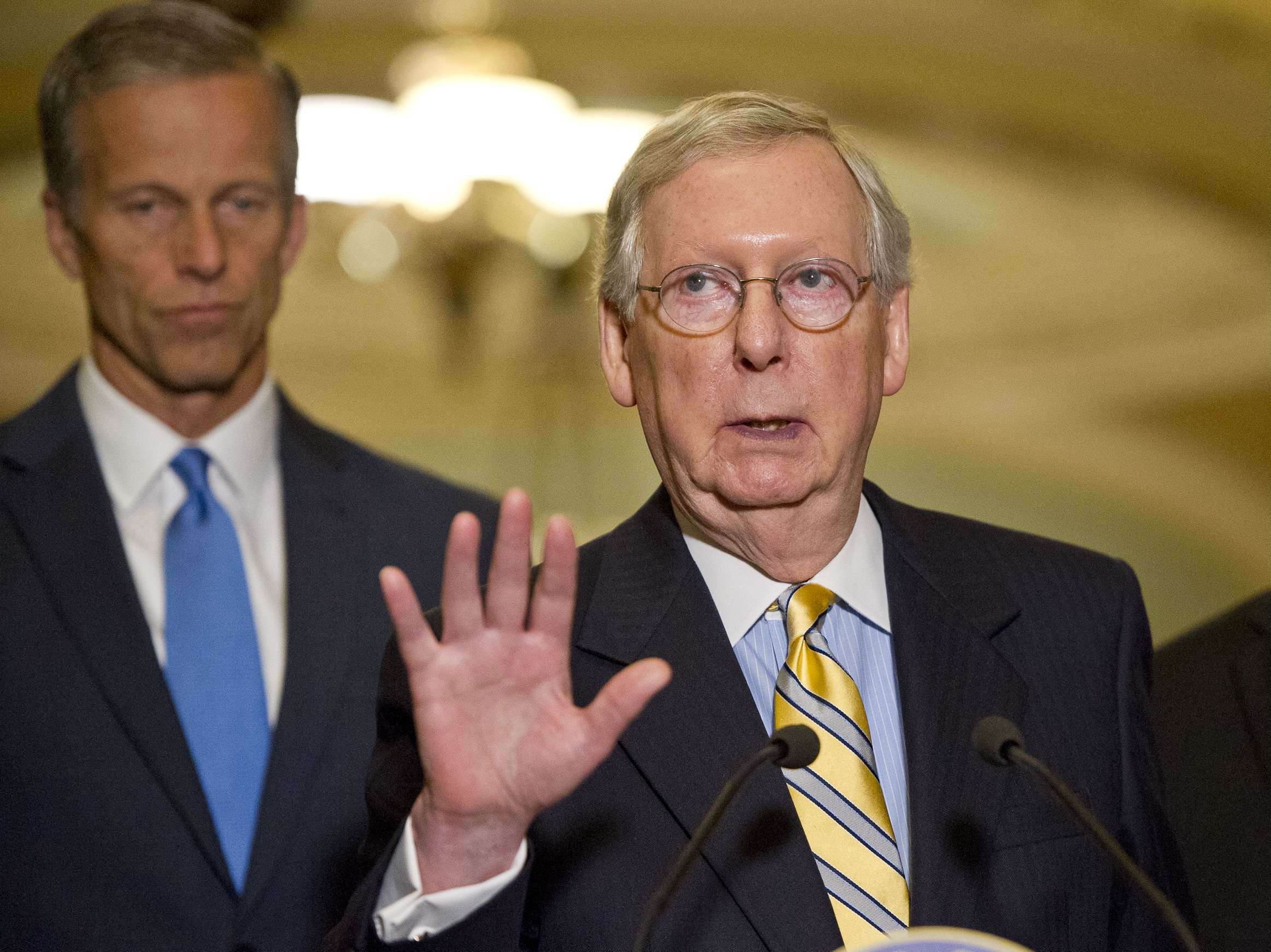Mitch McConnell Wants to Pass the Senate Health Care Bill By Making It More Expensive
After abruptly postponing a vote, dealmaking continues.

On Tuesday, Senate Majority Leader Mitch McConnell postponed a health care vote just hours after GOP leadership had promised that a vote would be held before the July 4 recess. Moderate and conservative Senators had expressed reservations about the legislation, and the move made clear that Republicans, who hold 52 seats in the upper chamber, didn't have the 50 votes necessary for passage.
The delay wasn't quite as dramatic as when the House pulled a health care vote from the floor back in March, but the effect was similar. The bill that Senate Republicans had hoped to rush to passage would instead have to be inched along, with difficult negotiations along the way and no guarantee of success.
Two days later, the negotiations have advanced somewhat, and several changes to the Better Care Reconciliation Act (BCRA) are reportedly in the works. But so far, McConnell still doesn't have 50 votes. As Sen. Shelley Moore Capito (R-West Virginia), one of the moderate holdouts on the bill, told the Associated Press this afternoon, "We're kind of at a stalemate right now."
As expected, McConnell is starting the negotiation by offering legislative tweaks to both conservatives and moderates. These tweaks eat into the bill's projected deficit reduction. McConnell, in other words, is hoping to secure votes for the bill by making it more expensive.
The first is the addition of $45 billion to treat opioids, intended to bring moderates on board. The second is a change to allow individuals to use money in health savings accounts to pay insurance premiums, a change designed to appeal to more conservative lawmakers. This would reduce the bill's scored deficit reduction by about $60 billion, according to The Washington Examiner. For procedural reasons, McConnell can only cut into the BCRA's deficit reduction score by about $200 billion in total. These changes consume about half of the money he has to play with.
McConnell's strategy runs the risk of wining over some votes while irking other GOP lawmakers. Sen. Rand Paul (R-Kentucky), for example, said that any process that involves offering money to moderates and regulatory changes to lawmakers on right the right "sounds to me like a Washington deal…I'm not going to go for that," according to Axios.
The most intriguing rumored change, however, is one floated by Sen. Ted Cruz (R-Texas). Cruz wants to allow insurers who sell Obamacare compliant plans to also sell plans that don't abide by the health law's rules and regulations. The idea is inject more choices into the market, and, in particular, to create less expensive options for healthy individuals.
The worry with this sort of provision is that it could essentially turn regulated Obamacare plans into pseudo-high risk pools, as healthy people buy cheap plans and sicker individuals buy more regulated products, leading to Obamacare compliant plans covering a small number of very sick people.
If that happened, though, it could cause the public cost of the program to skyrocket, since the BCRA's subsidies, like Obamacare's, are tied to plan prices. However, as Dylan Scott of Vox reports, Cruz agrees that this is a possibility, and even expects it, arguing that it would ultimately make for a more transparent program.
There are other issues with Cruz's proposal as well. The first is that as a regulatory change, it might not be allowed under the Senate's reconciliation process, which only allows for changes with a direct impact on the budget.
Cornyn told reporters that Cruz's ask to loosen regulations on insurers is running into some issues under reconciliation rules.
— Lauren Fox (@FoxReports) June 29, 2017
The second is that it might be a non-starter with other Republican senators. According to Axios, other Republicans are dismissing Cruz's plan because it would touch up against the law's preexisting conditions regulations — even though it would still preserve regulated plans.
All the little deals on taxes or opioids or Health Savings Accounts haven't changed the fundamental dynamic: They don't have 50 votes. https://t.co/VLGpobsX49
— Matt Fuller (@MEPFuller) June 29, 2017
As in the House, which eventually managed to put together votes on a bill, despite reservations from many GOP lawmakers, the Senate bill may yet pass. But it's far from a sure thing, and President Donald Trump, whose threats and cajoling helped push the House bill over the finish line, doesn't have the same sort of influence over the Senate.
That means it's largely up to McConnell to put together the votes. McConnell is by all accounts a master tactician, but even still, the disagreements we're seeing today mostly serve to reveal how difficult the dealmaking process will be.


Show Comments (25)